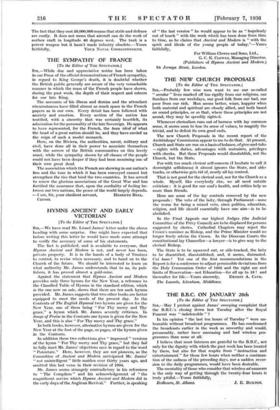THE NEW CHURCH PROPOSALS
[To the Editor of THE SPECTATOR.1
Sin,—Probably few wise men want to see our so-called " secular " lives marked off too rigidly from our religions, our Sundays from our weekdays, our good folk from our bad, our poor from our rich. Man seems better, wiser, happier when both material and spiritual are closely allied, and both based on sound principles, or so that, where these principles are not sound, they may be speedily righted.
Whenever clericalism runs out of harness with lay common sense, it seems soon to lose its sense of values, to magnify the trivial, and to defeat its own good ends.
The new Church Proposals_ in the recent report of the Archbishops' Commission appear to me to do that. At present, Church and State are run on a basis of balance, of give-and-take —rights with duties, advantages with restraints, privileges with checks. But these Proposals would disestablish, not the Church, but the State.
For with too much clerical self-concern (I hesitate to call it downright selfishness) it almost ignores the State, and side- tracks, or otherwise gets rid of, nearly all lay control.
That is not good for the clerical soul, nor for the Church as a whole. Myself, like everybody else, we all need outside criticism : it is good for our soul's health, and critics help us more than friends.
Here are some of the lay controls removed by the new proposals : The veto of the laity,-through Parliament—none the worse for being a mixed veto, since politics, education, religion, and life should essentially have one aim—is to be abolished.
In the Final Appeals our highest Judges (the Judicial Committee of the Privy Council) are to be displaced for persons suggested by clerics. Cathedral Chapters may reject the Crown's nominee as Bishop, and the Prime Minister would no longer freely advise the Crown. In the Diocesan Courts the constitutional lay Chancellor—a lawyer—is to give way to the clerical Bishop.
The State is to be squeezed out, or side-tracked, the laity to be disentitled, disestablished, and, it seems, distrusted. Cui brmo ? Yet one of the first recommendations in the Report is for a conference to adjust permissible deviations from the Holy Communion Order of 1662 and the right use and limits of Reservation—not Education—for all up to 18 ! and thereafter for life.—Yours sincerely, ERNEST A. CAVE. The Laurels, Ickenham, Middlesex.














































 Previous page
Previous page